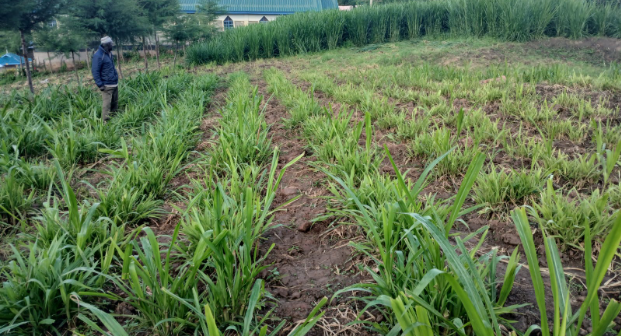Just two years ago, Mzee Mathew Kirui could purchase a 70kg bag of wheat bran, a preferred animal feed, for only Sh700.
This translates to about Sh10 a kilo, but nowadays, the cost of the same amount of feed rose by 100 per cent to Sh1,400.
“This has made me reduce the number of cows by almost half. The cost of animal feed is almost driving us out of business,” Kirui said.
It is out of this effect, among others, that has seen the county cushion farmers from the skyrocketing cost of animal feed and return them to profitability through the promotion of packchong.
Famed as Super Napier grass, packchong, whose origin is traced to Thailand, is a highly productive grass with a long leaf length of 6-8cm, capable of producing up to 20 tonnes of dry matter per hectare which can be harvested 7-8 times a year.
It can provide high yield for 7-8 years continuously with a harvest of 180-20o tonnes of green succulent grass per acre annually. The yield is twice that of ordinary napier grass.
It is also resistant to pests and diseases.
Governor Wisley Rotich said his administration has partnered with Commodity Market Exchange and Milands Commodity Trading Limited to promote the super napier.
“Each farmer will be required to do at least a quarter of an acre to support the livestock sector,” he said
“We shall be starting with 200 farmers per ward who will in turn share cuttings with neighbours. We want to increase our milk production from 100,000 litres to 500,000 litres daily.”
The programme, in its first phase, targets 4,000 farmers.
According to Dennis Muigai, who is the chief operations officer at Milands Commodity Trading Limited, the rising cost of livestock feed was threatening the milk production value chains in the county.
The company, whose vision is to revolutionise Kenya’s commodity markets by bridging the gap between producers, investors and industries, will supply packchong cuttings to farmers, enough to grow more than 7,000 acres.
“We have been monitoring Elgeyo Marakwet county on how it has embraced livestock production, and we have joined in to improve their milk production through provision of packchong grass cuttings. The programme will run throughout all the subcounties starting next week,” he said.
Kipchumba Chebore, a farmer from Lelan in Marakwet West subcounty, said he stopped buying livestock processed feed after planting packchong.
Governor Rotich says the county would invest more in livestock sector to boost production by farmers.
BY MATHEWS NDANYI












